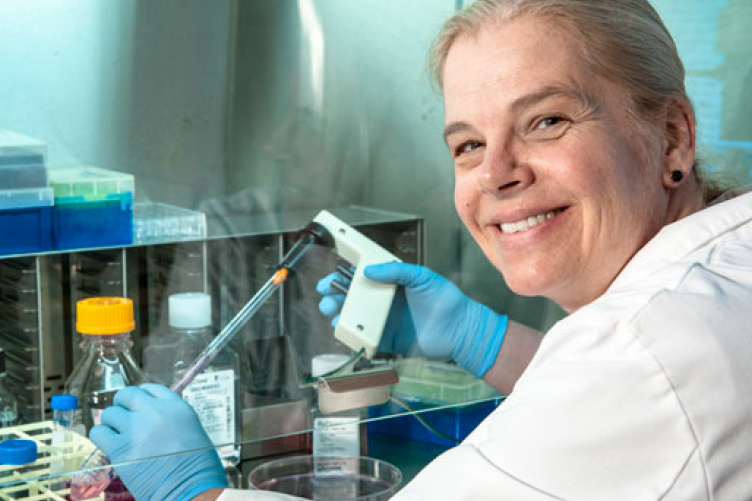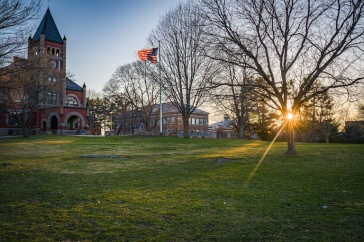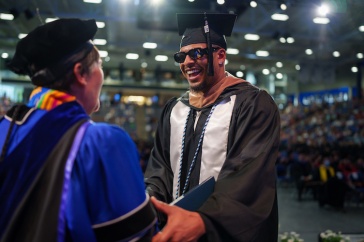
NSF Fellowship graduate student Nancy Fernades studying epigenetics in a lab at Gregg Hall
Four University of New Hampshire students received the highly competitive National Science Foundation (NSF) graduate research fellowships, which support outstanding graduate students in science, technology, engineering and math. NSF fellows receive up to three years of support, including an annual stipend of $30,000 and $10,500 for tuition and fees, and opportunities for international research and professional development. A fifth UNH student received an honorable mention.
“We are delighted for the students and the university,” says UNH Graduate School Associate Dean Cari Moorhead. “Having students win this award at UNH provides our faculty with an opportunity to have the best and brightest students working with them on their projects. The fellowship provides multi-year support, allowing students to focus on their academics without the burden of financial concerns. In addition, other students benefit from being on teams with such accomplished NSF fellowship recipients.”
The winners were Nancy Fernandes, an M.S. student in biochemistry; Patrick MacArthur, an M.S. student in computer science; and Amanda Daly and Lauren Koenig, both pursuing doctoral degrees in Natural Resources & Earth Systems Science (NRESS). Katrina Papanastassiou, an M.S. student in natural resources, was recognized with an honorable mention.
This year is UNH’s best showing ever in the NSF Graduate Research Fellowship Program. “Rather than the one award that UNH typically receives, this year we received four,” says UNH Senior Vice President for Research Jan Nisbet. “That’s exciting, because these fellowships are prestigious and reflect the quality of our students and the teaching and mentoring by UNH faculty members within a competitive research environment.”
Fernandes, a first-year master’s student working in the lab of Assistant Professor of Proteomics Feixia Chu, says that receiving NSF support has inspired her to remain at UNH for a Ph.D. in biochemistry. It’s a homecoming of sorts: Fernandes completed her freshman year at UNH in 1976-77, left to get married, and worked for many years as a diamond dealer and then massage therapist. She decided to get her bachelor’s degree in biology at UNH-Manchester after her son was diagnosed with Chiari malformation type I, a condition in which brain tissue extends into the spinal canal, causing severe headaches, scoliosis and other physical problems.
A third grader at the time of his 2008 diagnosis, he immediately underwent brain surgery at Children’s Hospital at Dartmouth College. Though the surgery eliminated some of his symptoms, he continues to receive outpatient care at Boston Children’s Hospital.
Fernandes’ interest lies in the relatively new area of epigenetics, which examines how protein modifications turn genes on and off without altering the underlying DNA. Specifically, she is trying to understand how epigenetic activity contributes to the development of the nervous system. Her work has the potential to provide insight into the origins of many diseases, including her son’s. “Instead of saying, ‘why my son,’ I wanted to find out how that happened and where it came from, because we’d had no history in our family of anything similar, and not much is known about what causes Chiari malformation.”
|
Patrick MacArthur |
Also a master’s student, MacArthur (B.S. ’12) is investigating remote direct memory access, in which messages from an application on one computer can be passed directly to an application on another computer, bypassing the central operating systems of both machines. “My research will enable more efficient, easier, and better use of high-performance networks,” explains MacArthur, whose adviser is Associate Professor of Computer Science Robert Russell. “That will improve research in many scientific areas, possibly leading to breakthroughs that will benefit society as a whole.”
MacArthur has wanted to pursue computing as a career ever since he learned how to write simple programs on his Apple II clone as an 8-year-old. “The computer science world has a myriad of open, exciting problems, and my research brings together many of the subareas of computer science that interest me: high-performance networking, parallel and concurrent programming, and data storage. The NSF fellowship will help me pursue advanced study in computer science and create solutions for real problems, including the movement of large amounts of scientific data.”
|
Amanda Daly |
A Ph.D. student in UNH’s Natural Resources department, Daly wants to learn how the interrelationships between soil bacteria and fungi create and maintain soil health. Her research aims to improve agricultural sustainability by uncovering how plants partner with soil microbes to access vital nutrients such as nitrogen from the soil. “For me, soil is a fascinatingly complex ecosystem and a frontier of science that biologists have only just begun to deeply explore,” says Daly, whose faculty adviser is Rowland H. O’Neil Professor Stuart Grandy. “As a scientist, I’m passionate about improving understanding of our natural world to enable land-management strategies that maintain ecosystem health and productivity.”
She is keen to promote interest in science among young people and underrepresented groups. “One day I hope to help train the next generation of graduate students to become compassionate, capable scientists themselves. The NSF fellowship will provide the funding to carry me through most of the Ph.D. training I need to develop as a researcher and mentor, and the prestige of the award will hopefully give me the foothold I need to break into the academic world as a professor and researcher.”
|
Lauren Koenig |
Even before her arrival at UNH, Koenig’s research had taken her from the Sierra Nevada Mountains to remote settings above the Arctic Circle to urban streams that drain into the Chesapeake Bay. Now in her first year as a Ph.D. student in the natural resources department, she has been working in streams in Puerto Rico. Her goal there is to scale up local measurements of fundamental ecological properties – metabolism, nutrient retention and food web dynamics – to understand the behavior of entire river networks. “My research at these sites focuses on stream metabolism – how carbon is produced, consumed and released into the atmosphere,” explains Koenig, who works with Environmental Science Professor Bill McDowell. “This research will advance our understanding of aquatic carbon cycling while also integrating river networks as important players in tropical carbon budgets.”
In addition to communicating her work to other scientists, Koenig enjoys bringing environmental research to K-12 students and teachers through hands-on programs and data-driven investigation. “The NSF fellowship will provide me with flexibility in time and resources to bring environmental science programs to students in both New Hampshire and Puerto Rico.”
|
Katrina Papanastassiou |
Papanastassiou is trying to understand how different land use types (such as farmland) and landscape features (such as roads) affect the genetic connectivity of the New England cottontail, a threatened species native to this region. “The ultimate goal is to use this knowledge to inform future management decisions and habitat restoration efforts,” says Papanastassiou, whose advisor is Research Assistant Professor of Natural Resources Adrienne Kovach.
UNH’s NSF fellowship winners in the 2013 competition are among 2,000 nationwide, out of more than 13,000 applicants. This year, the UNH Graduate School, Research Office and Office of National Fellowships worked together to encourage students to apply and to support them through the process, offering workshops and individual assistance. Twenty students applied, which is believed to be more than in any previous year.
The NSF Graduate Research Fellowship Program is the country’s oldest fellowship program directly supporting students in science, technology, engineering and math. Since its founding in 1952, the program has funded more than 46,500 students. Notable former fellows include U.S. Secretary of Energy Steven Chu, Google founder Sergey Brin, Freakonomics co-author Steven Levitt, and more than 30 Nobel Prize winners.
Originally published by:
UNH Today
Written by Sonia Scherr '13 MFA
-
Written By:
Staff writer | Communications and Public Affairs




















































